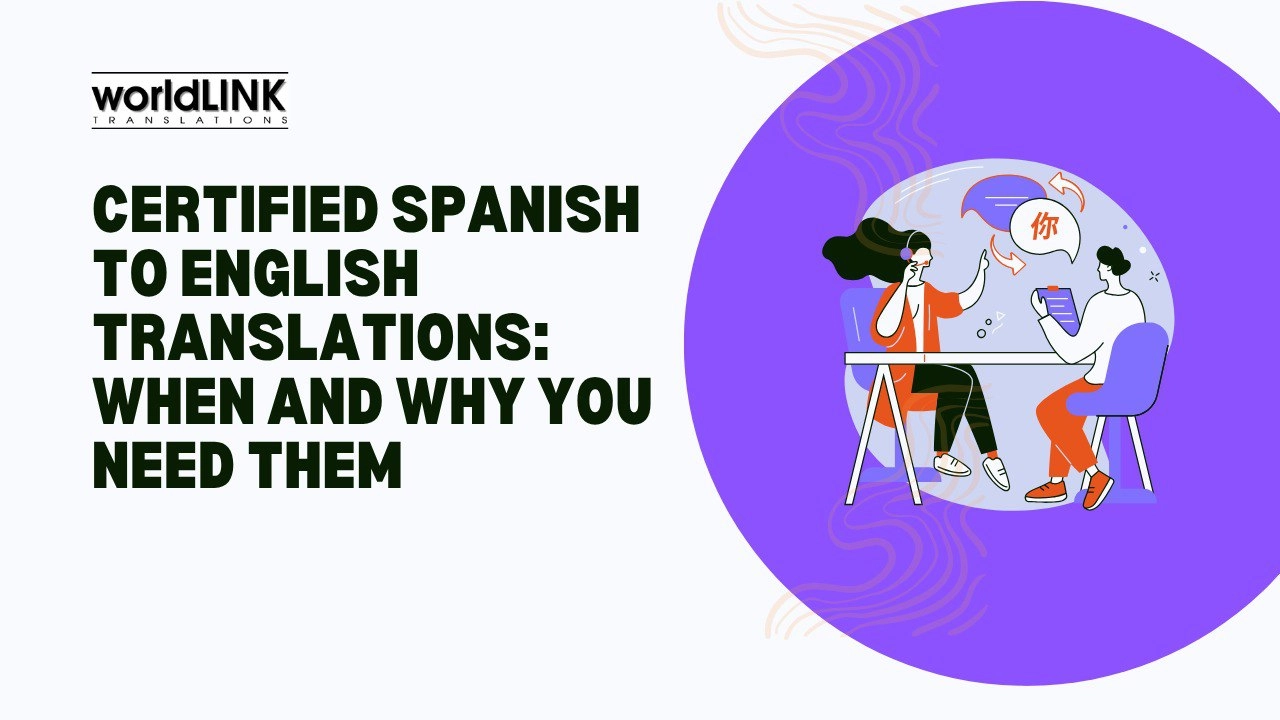Need to submit a Spanish document in the U.S.? You might need a certified Spanish to English translation. It’s not just about language accuracy, it’s about meeting legal standards, government requirements, and ensuring your documents hold up under scrutiny.
If you’re applying for a visa, dealing with legal paperwork, or submitting educational credentials, certified translations make sure nothing gets lost in translation.
What Is a Certified Translation?
A certified Spanish to English translation includes a signed statement from the translator or translation company attesting that the translation is accurate and complete to the best of their knowledge.
This isn’t a casual or automated translation, it’s a legally recognized document, often required by:
- Government agencies (like USCIS)
- Courts and legal institutions
- Educational institutions and licensing boards
- Employers and HR departments
- Medical institutions for insurance claims
The certification gives decision-makers confidence that the translation is faithful to the original and can be relied upon as official.
When Do You Need a Certified Translation?
Wondering when certified translations are required? Here are common scenarios:
- Immigration applications (USCIS requires them)
- Legal proceedings and court filings
- University admissions or transcript evaluations
- Professional license applications
- Employment background checks
- Real estate transactions involving international clients
- Healthcare record transfers between countries
In these cases, accuracy isn’t optional, it’s mandatory.
Common Documents That Require Certification
Here are just a few types of official document translations that often require certification:
- Birth certificates
- Marriage and divorce records
- Academic transcripts and diplomas
- Legal contracts and affidavits
- Medical reports
- Power of attorney documents
- Immigration documents
- Financial statements
These documents often serve as legal evidence, so even a small error can create delays or rejections that cost time and money.
Certified vs. Notarized Translation: What’s the Difference?
Many people confuse certified translations with notarized translations, but they’re different:
- Certified: Comes with a statement from the translator affirming accuracy.
- Notarized: A notary public verifies the identity of the person signing the certification, not the accuracy of the translation itself.
In most cases, certified translations are sufficient, but some institutions (especially abroad or in legal contexts) may request notarization as well.
Why Certification Matters for Legal and Immigration Cases
Legal systems and immigration agencies demand precision. The stakes are high.
An uncertified or inaccurate translation could:
- Lead to application rejection
- Cause delays in visa or green card processing
- Compromise the integrity of a legal case
- Result in resubmission costs or missed deadlines
That’s why legal translation services must be handled by trained, vetted professionals who understand both language and law.
How Certified Translations Help in Education and Career
Students and professionals also rely on certified translations when:
- Applying for universities abroad
- Seeking scholarship eligibility
- Registering for board exams or licensing
- Verifying credentials for employment
In competitive environments, properly translated documents enhance credibility and speed up decision-making.
Need USCIS-compliant translations? We specialize in government and legal documents.
What to Look for in a Certified Translation Provider
Look for these when choosing a professional translation service:
- Experience with official documents
- Native-level proficiency in both Spanish and English
- Familiarity with USCIS and court requirements
- Willingness to provide signed certification
- Fast turnaround times and transparent pricing
- Data privacy and confidentiality policies
Avoid generic platforms or machine-based translations if accuracy is critical. Certified work must be human-verified and legally compliant.
Contact World Link for Certified Translations Today
Why World Link Is Trusted for Certified Translations in Massachusetts
World Link delivers fast, accurate, and legally compliant certified Spanish to English translations for clients across Massachusetts and beyond.
We specialize in:
- USCIS-compliant translations
- Court-ready document translations
- Education and licensing support
- Translation for financial and healthcare documents
Our translators are certified, bilingual professionals who understand both the linguistic and legal nuances involved.
FAQs About Certified Spanish to English Translation
Q: Can I translate my own documents and certify them?
A: No. USCIS and most official institutions do not accept self-translated documents, even if you are fluent. Translations must be done by an independent, qualified party.
Q: How long does it take to get a certified translation?
A: Most certified translations are completed within 24–72 hours depending on document length and urgency.
Q: Do I get both digital and physical copies?
A: Yes. World Link provides both soft and hard copies upon request, each including the signed certification.
Ready to Get Started?
Don’t risk delays, Get your certified Spanish to English translation now.
Final Thoughts
If you’re working with any official Spanish-language documents, a certified translation isn’t just a nice-to-have, it’s a must.
With the stakes so high in legal, academic, and immigration contexts, trust your documents to a certified team that understands what’s at risk.
When accuracy matters, certification counts. Choose World Link.

